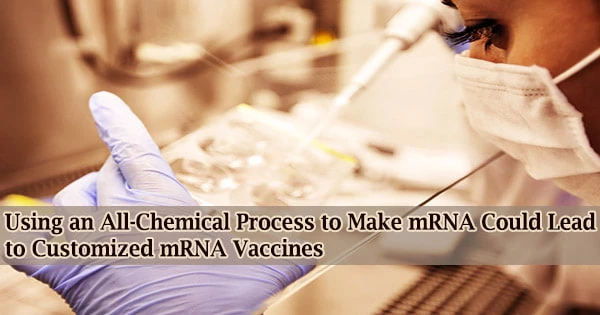Researchers at Nagoya University in Japan have discovered a new chemical-only approach that could be a game-changer in terms of developing personalized mRNA vaccines for a number of diseases while also allowing for the low-cost production of vast amounts of mRNA.
mRNA vaccines were successfully utilized to improve immunity during the COVID-19 pandemic. These vaccines instruct cells on how to produce a protein that activates the immune system, allowing the body’s natural defenses to detect the invading virus.
Current biological vaccines, on the other hand, do not allow for the precise molecular design of mRNA, limiting their potential in developing new vaccines as variants emerge.
Médecins Sans Frontières (MSF) asked Imperial College London to examine the suitability of injectable medicines manufacturers as potential mRNA vaccines manufacturers and estimate the resources required to manufacture up to 100 million doses of mRNA vaccines annually at such facilities in order to understand how scaling up mRNA vaccine manufacturing can be accelerated.
The data for the two WHO-listed mRNA vaccines, BioNTech-BNT162b2 Pfizer’s vaccine (30 micrograms (µg) of mRNA per vaccine dosage) and Moderna’s mRNA-1273 vaccine (100 g of mRNA per vaccine dose), was acquired or approximated.
A research group led by Professor Hiroshi Abe and Associate Professor Naoko Abe of Nagoya University’s Graduate School of Science has created the first entirely chemical production technique for mRNA, according to ACS Chemical Biology.
The researchers generated a component of mRNA known as the cap in their research. The cap is vital because it facilitates mRNA protein translation and protects mRNA from destruction.
Our research suggests that it is possible to make mRNAs with precisely introduced chemical modifications with complete control over the process. The molecular design reported in our study exhibits five times higher translational activity than that of enzyme-produced natural-type mRNA. This means that mRNA can be synthesized in large quantities at low cost using chemical synthesis.
Professor Hiroshi Abe
The two currently used biological methods for preparing synthetic mRNA, such as that used in vaccines, rely on enzymes to insert the cap structure into the mRNA. The researchers discovered, however, that their method could produce a range of chemically modified mRNA strands with a cap structure.
According to Professor Hiroshi Abe: “our research suggests that it is possible to make mRNAs with precisely introduced chemical modifications with complete control over the process. The molecular design reported in our study exhibits five times higher translational activity than that of enzyme-produced natural-type mRNA. This means that mRNA can be synthesized in large quantities at low cost using chemical synthesis.”
Chemically modified mRNA could be utilized to develop personalized vaccinations against a wide range of infectious disorders, including viruses and malignancies.
Professor Abe explains, “By introducing these chemical modifications, the mRNA becomes stable. This could allow for the creation of long-lasting and effective mRNA vaccines. In addition, it could allow mRNA to be administered directly instead of using lipid nanoparticles, which are used for delivery in current vaccines.”
“One of the exciting implications of this research is that this could be used in the next generation of vaccines,” the researchers said. “We hope that the capping method reported here will be of great use in the development of RNA therapeutics.”
Funding: The research was funded by the AMED LEAP project ‘Innovation of Chemistry-Based Molecular Design and Production Methods for mRNA and its Application to Vaccines,’ which began in FY2021.





